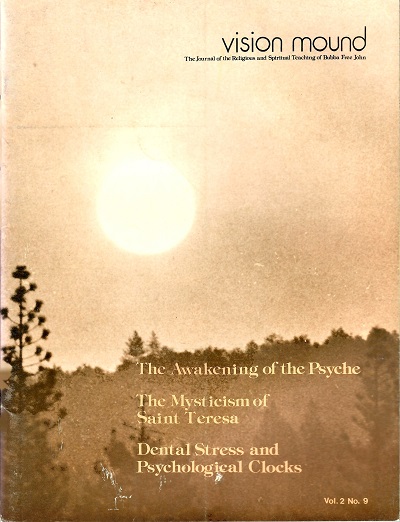Aging is Not a Matter of Years
Vo.2 No.9
1979

Psychological Clocks

by Bubba Free John
Aging is not a matter of years but of bodily cycles or “clocks.” Thus, some people age relatively slower or faster than others. And the aging process may be slowed by various rejuvenating habits or regimens that are native and natural to the bodymind.
The usual human being, even by virtue of birth itself, has or acquires “psychological clocks,” tacit beliefs regarding how his health and vitality are supposed to develop or degenerate according to his age. These clocks are generally an “age mythology” that tends to perpetuate itself from generation to generation. Our habits and conditions of living tend to reflect our psychology and beliefs, and human beings do in fact become, develop, and degenerate in accordance with their subjective clocks. But the “clocks” may be changed, if they are arbitrarily established and negative in effect. Indeed, they must change as we pass from stage to stage of growth, and as we operate on new levels of energy and presumption.
If an individual lives a spiritual life, founded in Truth and love, and practices a vitalizing or regenerative regimen of diet and life-activity in general, then he can change the clocks that are set by conventional beliefs and habitual reactivity. To begin with, he must simply and intelligently release all belief in the old clocks —the assumptions of necessary disease and degeneration. And, secondly, he must establish a habit of life that is completely free of degenerative and reactive practices.
Part of the belief psychology of these “clocks” is that the bQdy necessarily loses its vitality with aging. Life, like sex, is felt always to move toward a crisis of emptying, or of discharge of Life. There is a stage of life, ranging from thirty to fifty years of age, when people generally ex- pect to pass through a degenerative “crisis”: chronic health problems, devitalization, loss of strength and stamina, menopause, impotence, gray hair, loss of hair, arthritis, rheumatism, eye problems, and so forth. Menopause, in particular, is a classic example of a psychologically “clocked” degenerative crisis. Somewhere between thirty and fifty years of age, a woman believes that she will become infertile, that either she stops producing egg cells or the eggs become incapable of fertilization, and that she will cease to produce hormones for the reproductive process. When menopause does in fact occur, it is a sign or “proof” of enervation and degeneration, produced in accordance with clocked beliefs. We are psychologically predisposed to expect and experience the progressive failure of experiential life as the years progress. We are convinced that aging will manifest a progressively degenerative cycle until death. And we can point to the experience of generations of human beings as proof that we are only being “realistic” in our depressed convictions.
The degenerative crisis and its progressive cycle are, however, not necessary. They are likely, unless there is a complete change in the disposition and habits of the individual, but they are not necessary. Practices can be engaged to prevent or at least minimize the degenerative crisis that is socially clocked into us bodily and psychically. These include simple practices of appropriate regenerative diet and fasting, exercise, use of herbs and other rejuvenating substances, vitamins, and natural food supplements. Other practices are ultimately necessary. These include the whole life of love and humor, an intimate life in an environment, both physical and cultural, that is natural and essentially peaceful. The whole matter of sexuality must also be transformed. If the conventional, degenerative orgasm continues as the obsessive goal and practice of our vital feelings, it is quite natural that the life cycle as a whole will remain oriented toward a similar degenerative crisis. (.The Eating Gorilla Comes in Peace deals with certain basic aspects of sexual relationship, but the full description of the regenerative practice is given in Love of the Two-Armed Form.) Some of the naturally regenerative practices available to mankind are commonly known, if uncommonly practiced, while others are hidden, or veiled to inexperience, within the esoteric processes of spiritual life. Still others may yet be discovered, such as sophisticated, scientific ways of treating the cellular and molecular processes.
None of these practices will prevent the normal processes of change from occurring. They will simply prevent the progressively and negatively degenerative pattern, and only in cases where the most complete psycho-physical revision of belief and practice can be realized. The body inevitably changes overtime, but its changes are not necessarily degenerative. In the normal process of growth and change, the bodily being moves with age from the elemental toward the etheric, and from the gross to the subtle. The bodily being becomes less vital-physical in orientation, but it need not become devitalized. Its energy should only increase, but its food and Fullness may become more and more subtle. Eventually, the fully mature and aged individual should only become suddenly “tired” in the physical body, and the physical will simply “go to sleep.” Death is merely the falling away of the present elemental structures or extensions of the total bodily being. The physical body itself becomes vulgar from the point of view of the total being—and so it falls off. At death, the manifest being is simply entering one of its subtler dimensions of experience, wherein it is still present as a bodily being fit for the food of the place wherein it appears. ♦